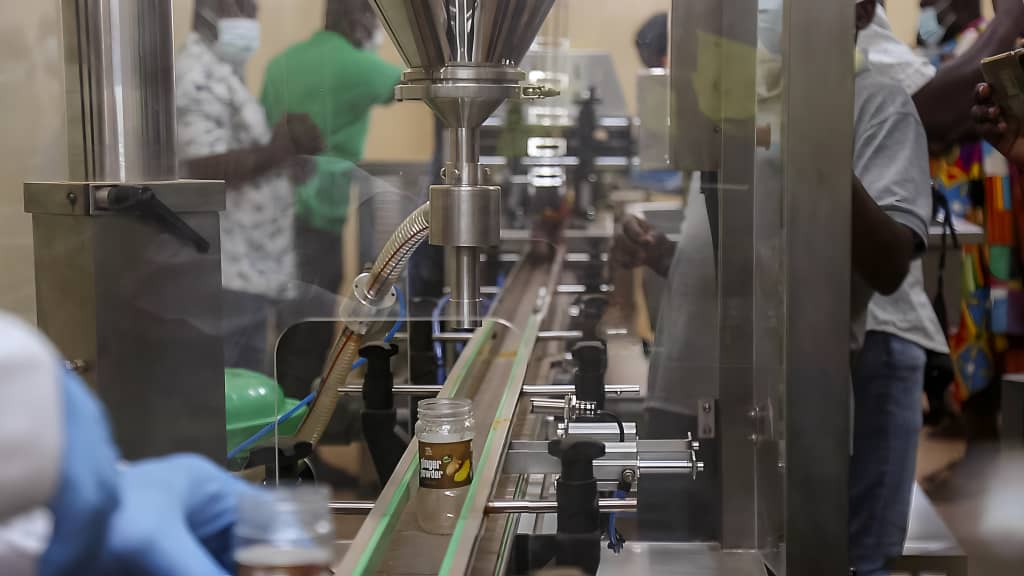Accra, Feb.13, GNA – The lack of access to ready markets and inadequate value-addition avenues for perishable crops are two critical challenges inhibiting sustainable agricultural growth in Ghana.
Tonnes of food produce are wasted annually due to these issues, with some smallholder farmers experiencing as high as 30 per cent postharvest losses, the African Centre for Economic Transformation (ACET) has estimated.
As a result of their inability to access markets, which leads to losses, most farmers prefer to sell their produce at the farm-gate.
Like many other farmers in the country, the woes of smallholder farmers in the Ahafo Region are not different, as they struggle to minimise postharvest losses because of the lack of modern equipment, technologies and approaches.
Despite the significant advances in food storage methods, most of the farmers still rely on indigenous vessels such as mud silos, barns, cribs, and drums for the storage of grain, fodder, and seed.
Agriculturists are of the view that such storage vessels are simple to construct and inexpensive to maintain, but are unable to protect the produce from biological, physical and environmental hazards for a prolonged period of time.
The scenario, however, is being changed for the better by the kind courtesy of the decision by mining giant, Newmont, to revamp the Asutifi Processing and Services Centre (APSC).
The expanded facility, inaugurated recently, marks a significant development to boost the agricultural value chain in one of Ghana’s strategic food producing Regions, notably in chilli pepper and ginger production.
The US$4 million Centre has been established by mining giant, Newmont, with support from the German Development Cooperation, to bring to the barest minimum the incidence of postharvest losses.
It is envisaged that the initiative will, in the long term, improve the incomes and livelihoods of farmers, thereby opening up the local economy for sustainable growth.

Earning the description; “The food basket of Ghana”, the region’s soil type and rainfall pattern support the cultivation of varied food and cash crops, with farmers engaged in both subsistent and commercial production.
One critical challenge, particularly with commercial farming, is the inadequate value-addition avenues for perishable crops, including chilli pepper and ginger.
“The revamped APSC signifies Newmont’s dedication to fostering local economic growth, promoting sustainable development, and supporting agricultural value chains in the Ahafo Region, recognised as the breadbasket of Ghana,” says David Thornton, the Managing Director of Newmont’s Africa Business Unit.
Over 80 farmer-based organisations and about 1,000 chilli pepper and ginger farmers are benefiting from the APSC through an out-grower scheme, guaranteeing them increased and consistent income.
Besides the processing of chilli pepper and ginger, the facility, situated at Subriso, a community along the Acherensua-Hwidiem road, is also expected to add value to every step of the farmers’ activities, from production to market.
In 2013, Newmont, which operates the Ahafo Mine in the Ahafo Region and the Akyem Mine in the Eastern Region, established the Asutifi Processing and Services Centre, in collaboration with the German Development Cooperation.
The project was initially designed on a pilot basis to explore processing and marketing opportunities for agricultural produce at Ahafo.
This was after extensive engagements with the beneficiary farmers and assessments to understand the agricultural value chain in the region and the opportunities therein.
In line with Newmont’s social performance strategy, which aims to enhance opportunities for people in its host communities, particularly the youth and women, the APSC became a significant vehicle to support the livelihoods of the people and create sustainable jobs in the area.
The project, being implemented under Newmont’s broader Local Economic Diversification (LED) initiative, focuses on fostering partnerships with development agencies as well as the government with an aim to improve the living conditions of the people.
It seeks to identify business opportunities, create employment and promote sustainable development in the company’s host communities.

The facility, which started operating in 2013, encountered some challenges that impacted the realisation of its full potential, including limited raw materials to feed the factory and ready markets for the products.
In the course of time, Newmont conducted extensive feasibility studies in 2018 to confirm the viability of a bigger facility with the requisite market demand for processed chilli pepper and ginger.
The outcome of the assessment justified the company’ssignificant investment to scale up the project and create job opportunities, especially for farmers in the area and those in the agricultural value chain.
“The German Development Cooperation is happy to partner Newmont on this project, which has a huge potentially positive impact for the farmers,” John Duti, the Team Lead of Invest for Jobs at GIZ Ghana, remarked at the inauguration of the revamped Asutifi Processing and Services Centre.
“It will aid increased productivity by addressing the issue of postharvest losses, one of the key challenges in the agricultural sector.”
Newmont, one of the world’s leading mining companies, is among Ghana’s largest taxpayers, and its development foundations at Ahafo and Akyem continue to support host community development.
GNA